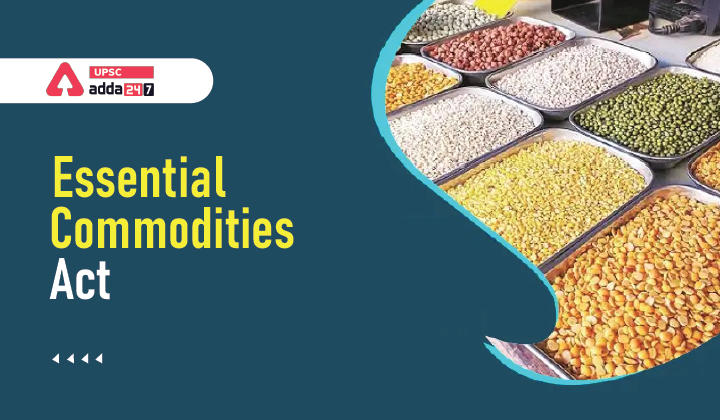Table of Contents
Essential Commodities Act- Relevance for UPSC Exam
General Studies III- Issues related to direct and indirect farm subsidies and minimum support prices; Public Distribution System-objectives, functioning, limitations, revamping; issues of buffer stocks and food security; Technology missions; economics of animal-rearing.
In News
With tur dal prices surging since mid-July and reports coming in of some traders creating artificial supply squeeze by restricting sales, the Centre has invoked the Essential Commodities Act of 1955 to ask States to monitor and verify the stocks available with such traders.
Essential Commodity Act
Historical Background
- The EC Act was legislated at a time when the country was facing scarcity of foodstuffs due to persistent abysmal levels of foodgrain production.
- The country was dependent on imports and assistance (such as wheat import form US under PL-480) to feed the population.
- To stop the hoarding and black marketing of foodstuffs, The Essential Commodities Act was enacted in 1955.
Features
- The ECA 1955 is used to curb inflation by allowing the Centre to enable control by state governments of trade in a wide variety of commodities.
- The Ministry of Consumer Affairs, Food and Public Distribution, implements the Act.
- By declaring a commodity as essential, the government can control the production, supply, and distribution of that commodity, and impose a stock limit.
- There is no specific definition of essential commodities in the Essential Commodities Act, 1955. Section 2(A) states that an “essential commodity” means a commodity specified in the Schedule of the Act.
- Under the EC Act of 1955, if the Central government thinks that it is necessary to maintain or increase supplies of any essential commodity or make it available at fair prices, it can regulate or prohibit the production, supply, distribution and sale of that commodity.
- Some of the essential commodities listed out in the schedule to this Act are foodstuffs including edible oils and oilseeds, drugs, fertilizers, petroleum and petroleum products.
- Centre has the power to add or remove any commodity in public interest from this list, and that’s what it has done with masks and hand sanitizers.
- When the prices of any of the essential commodities rise, the government imposes stock-holding limits to prevent hoarding, confiscates the stocks of violators and imposes punishment.
Issues
- In recent years, there has been an argument that the EC Act was draconian and not suited for times when farmers face problems of plenty rather than scarcity.
- The Economic Survey 2019-20 argued that it hampered remunerative prices for farmers and discouraged investment in storage infrastructure.
- Traders generally buy less than their usual capacity which inflict huge loss for the farmers during surplus harvests of perishables which leads to farmers being unable to get better prices due to lack of investment in cold storage, warehouses, processing and export.
- Owing to these issues, the Parliament passed the Essential Commodities (Amendment) Bill, 2020 but due to farmers’ protest the Government had to repeal this law.
Way Forward
The ECA 1955 was brought when India was not self-sufficient in food grains production but now India has become surplus in most agri-commodities, and the amendments in the ECA 1955 was an important step by the government to achieve its target of doubling farmers’ income and also for ease of doing business.
Though the same has been repealed due to protests, government should work closely with farmers and farmer’s association to collectively amend the ECA as per farmer’s need and bring about the changes that are suitable for present scenario.




 TSPSC Group 1 Question Paper 2024, Downl...
TSPSC Group 1 Question Paper 2024, Downl...
 TSPSC Group 1 Answer key 2024 Out, Downl...
TSPSC Group 1 Answer key 2024 Out, Downl...
 UPSC Prelims 2024 Question Paper, Downlo...
UPSC Prelims 2024 Question Paper, Downlo...




